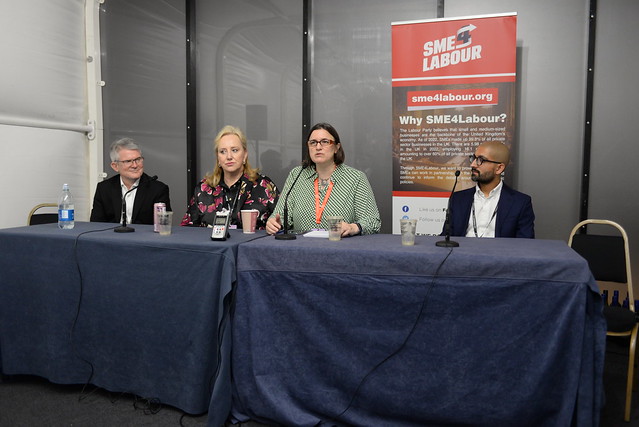The Labour Party Annual Conference 2023
SME4Labour, Open Banking, Truelayer and NatWest fringe: Open Banking: an Engine of the Digital Economy
🎫 Tickets are free, but booking is required via https://www.eventbrite.co.uk/e/673857986377
This event is in the secure zone, so you will need a conference pass to access it.
🗓 Date: Tuesday, 10 October 2023
⏳ Time: 12:00
📍Location: SME4Labour POD (Meeting Room 22), ACC Liverpool, Kings Dock Street, Liverpool, England, L3 4FP
SME4Labour, Open Banking, Truelayer and NatWest fringed: Open Banking: an Engine of the Digital Economy with Marion King, Chair of Open Banking; Stephen Wright, leading market engagement and the delivery of regulatory requirements with respect to Open Banking/Finance at NatWest Group; Mo Mirza, Chief Financial Officer (CFO) at TrueLayer and Lord Iain McNicol. This panel discussion was chaired by Emily Wallace, SME4Labour.
Emily Wallace initiated the panel discussion, focusing on the repercussions of open banking five years on and its particular impact on small and medium-sized enterprises (SMEs) and consumers, with a specific emphasis on SMEs.
Marion King underscored the inclusive nature of open banking, highlighting its role in providing account owners, whether individuals, SMEs, or organizations, with control over their financial assets. She emphasized the diverse applications offered by FinTech companies across the UK economy, with over 300 FinTech firms now utilizing open banking as a foundational aspect of their business models. The next crucial phase involves extending access to open banking beyond the nine banks currently providing their API suite, ensuring widespread and equitable access. Stephen Wright also emphasized the pivotal role of data sharing and standardization facilitated by APIs in simplifying business management.
Lord McNicol raised concerns about safeguarding consumers and SMEs in light of the rapid transaction speed and the promise of reduced fraudulent activities. Marion addressed these concerns by highlighting that open banking is built upon the security frameworks of existing banks and functions as a trust framework. While ensuring robust security, open banking does not access or store data directly but rather facilitates the secure flow of data through a trust framework. It effectively onboard and monitors transaction flows. Two key workstreams in the Joint Regulatory Technical Standards (JRTS) are dedicated to mitigating financial crime risks and enabling more efficient data exchange within the banking ecosystem.
In summary, the panel discussion revolved around the impacts and potential of open banking, particularly with regard to SMEs and consumers. The conversation stressed the inclusive and transformative nature of open banking, its role in simplifying business management, and the measures in place to ensure the security and trustworthiness of the system for the benefit of all consumers and SMEs.

